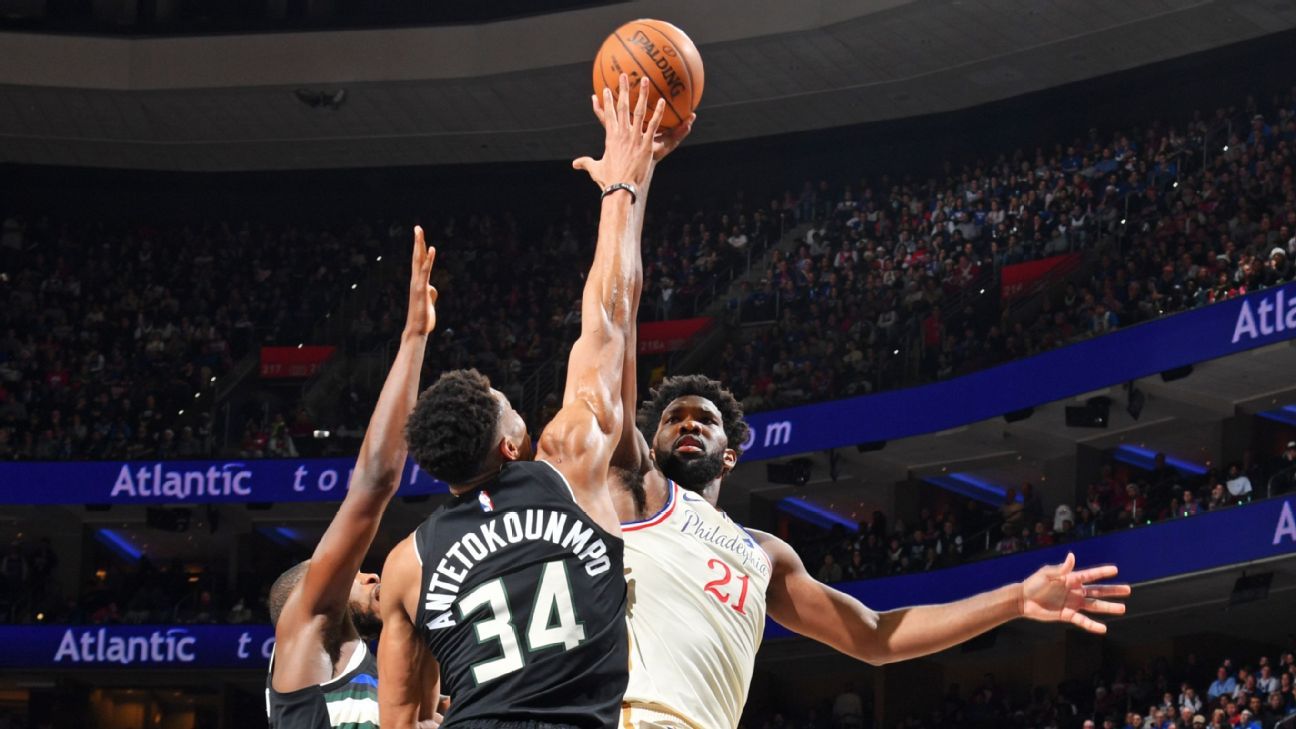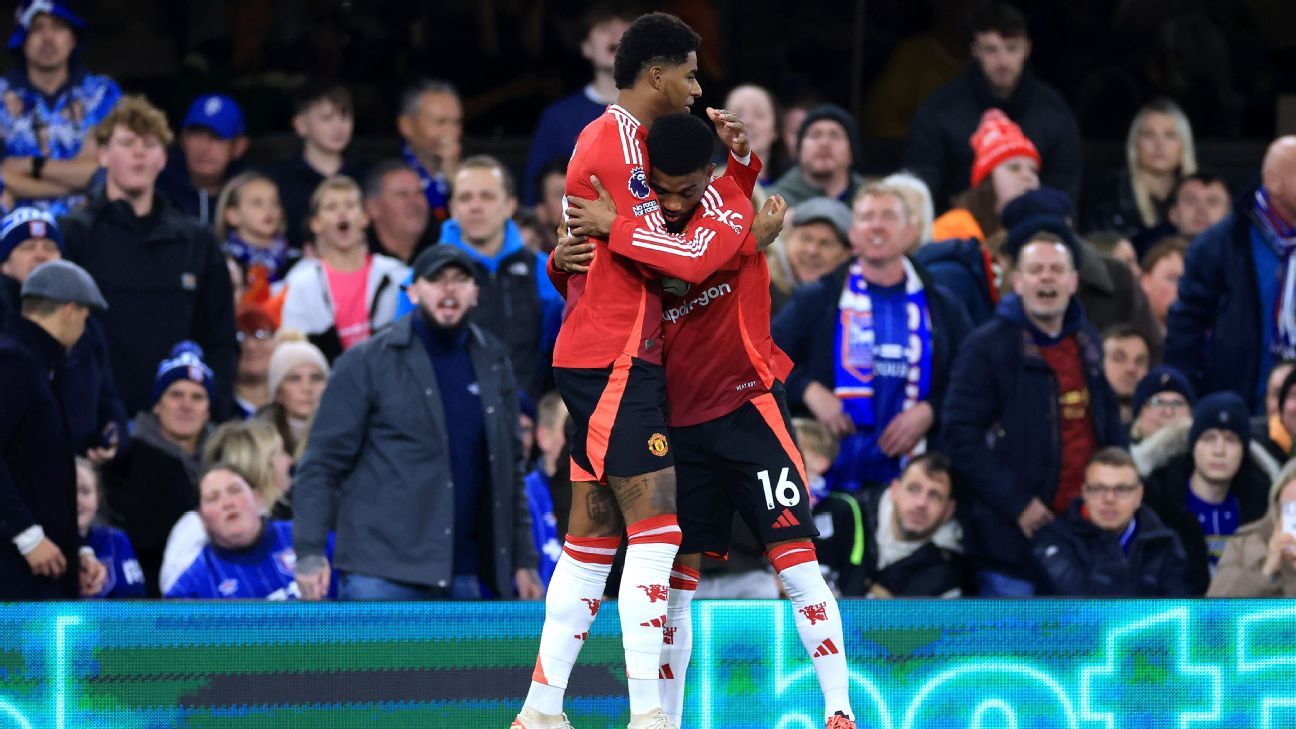
As the Philadelphia 76ers have failed to get out of the second round of the playoffs the past two seasons, the team's struggles in half-court offense -- and questions about who would have the ball in the game's dying moments -- have been front and center.
At the heart of that debate has been All-Star center Joel Embiid, the NBA's most dominant low-post scorer -- which typically is hard for teams to utilize in late-game situations. So, as the Sixers have been preparing for the NBA season to resume, Sixers coach Brett Brown said the team has been specifically focusing on Embiid's ability to read double-teams in the post, thinking it will be one of the keys to unlocking the offense and allowing the Sixers to advance deep into the postseason.
"He's going to be double-teamed more than he isn't," Brown said after Thursday's practice. "You can book it -- he spins baseline, the whole gym is coming, I don't care who we are playing.
"What is happening [on his post-ups] in the playoffs, it's because they go at him more repetitively in a seven-game series. It's that heightened awareness for an NBA first-team All-Star. And, so I think this camp, one of the things I have been doing is damn near every time he catches it, we're coming [with a double-team]. ... He's done a really good job passing out of it. And so whether they come at him, whether he's going to be able to architect a quarterback mentality out of that post-up or whether he's just going to play bully ball and go dunk and score, I think that we're moving toward the reads that are coming."
Embiid is one of the few dominant post players in a league who has become increasingly dependent on perimeter shooting. He logged the fifth-most post-ups in the NBA this season (429) per Second Spectrum tracking data, had the second-most direct points created from them (397) and the fourth-best points per post-up (1.099).
Things have been different, however, in the playoffs. Over the past two postseasons, Embiid has seen his numbers dip to just .907 points per post-up -- 13th among the 18 players who had at least 50 post-ups over that time frame.
Some of that can be attributed to Philadelphia's lack of spacing, and some of it, as Brown said, can be credited to defenses loading up on Embiid inside. While Embiid said he has improved on his post passing, he said there are other ways that Philadelphia can involve him in the offense to avoid trying to rely on him creating shots in the paint.
"If teams are going to double me every single possession when I'm on the court, I should not just take to catching it out of the post," he said. "There's so many ways to get me involved in the offense. I can attack from the 3-point line, push in transition; the coaches can draw a play to get me a shot where I don't have to really fight for it, so that's good.
"That's good we are doing that and we are getting me used to [double-teams] because it's going to happen in the playoffs every single possession. So, I have to be ready. I feel like I've improved, and it's all about patience and I either have it or don't. If I don't, pass it back out and trust my teammates to make those shots. And if I do have an opportunity, take it."
Brown also said he wants Embiid to shoot a "minimum" of 10 free throws per game in the playoffs. Embiid averaged over 10 free throws per game in the regular season last year, but that number dipped to 8.7 attempts per game this season -- still the sixth most in the NBA.
The past two years, Embiid has shot 7.6 and 8.2 free throws per game in the playoffs but says the 10-per-game goal Brown put out there is a realistic one for him.
"That's already what I do," Embiid said. "[My] free throws were a bit down this year, but when you look at last year, or the last two years, I go there about 10 times a game. That's really my game. Just be physical, and either score or get fouled. A lot of people might see it as, 'He's always looking to get fouled,' but that's just the way it is.
"I guess I'm a pretty good free throw shooter, so I would take that any day. It's about me being aggressive, and like I said through double-teams, if there's double-teams or not, just be aggressive or get to the line. That's always been an emphasis when it came to my game, and I intend to just keep on going."
The Sixers went out and traded for Jimmy Butler last season to try to solve their problem of who would be their late-game engine on offense -- only to then move on from Butler in a sign-and-trade after the season that brought Josh Richardson to Philadelphia in his place. With Butler gone, the pressure will now be on Embiid more than ever to deliver buckets late in games.
In addition to his work on passing out of double-teams, Embiid said the other thing he's been working on during the hiatus since the season was suspended on March 11 was his fadeaway jumper -- and he is very pleased about its progress.
"My fadeaways look great," he said with a smile. "I've been working on them the past 2½ months, six times a week, just trying to perfect my game in any ways that I can, and I've been happy about that. It is something I'm going to need a lot, especially when other teams double me every single possession. I can't let that dictate the way I play.
"So, sometimes you have to make the right play, and sometimes pass it, and if I feel like I have an opportunity to be myself and dominate, then that's a shot I'm going to get. So that's what I've been excited about."















 Phone: (800) 737. 6040
Phone: (800) 737. 6040 Fax: (800) 825 5558
Fax: (800) 825 5558 Website:
Website:  Email:
Email: 






